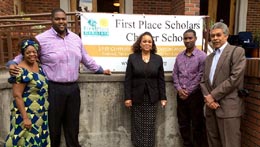On September 3, 2014, First Place Scholars, a private school in Seattle's Central Area serving homeless and traumatized students in kindergarten through 5th grade, becomes Washington's first charter school as classes begin for the new school year. The charter-school opening was celebrated the previous day with a ribbon-cutting ceremony and open house attended by school alumni, parents, teachers, students, school volunteers, and the media. Although seven other non-profit organizations in the state also are authorized to become charter schools, First Place Scholars, with a successful 25-year history behind it, is the first to make the change. Two months after the opening, longtime neighborhood activist and former State Representative Dawn Mason (b. 1945), a past president of the First Place Scholars board of directors who has played a leading role in the school's transition to charter status, will return to the board and again be chosen as its chair.
Washington's Charter-School Movement
Strongly opposed by the Washington Education Association (WEA), the state's teacher's union, the charter school movement was slow to take hold in Washington. Although the state House of Representatives passed legislation four times between 1995 and 1998 to allow charter schools, the bills died in committee in the state senate. Finally, in 2004, the legislature passed a charter-school bill by a narrow margin. But charter-school opponents, led by the WEA, gathered enough signatures to place Initiative 55 on the ballot that fall, expecting voters to reject charter schools at a time when public schools were being closed for lack of funding. They were right -- voters said no to charter schools in 2004, as they had twice before.
Charter-school supporters, including Bill Gates (b. 1955) and Paul Allen (1953-2018), gave large amounts of money in support of the ballot measures, but it wasn't until the fall of 2012 that voters eventually said yes by approving Initiative 1240, making Washington the 42nd state to allow charter schools. Large amounts of money were spent on both sides of the issue, and the Gates Foundation teamed up with a group calling itself the League of Education Voters to create the Washington Charter Schools Association, attempting to address concerns about public funding of privately run schools.
Fearing that charter schools would drain the state's already-depleted education funds and that there would be little control over the privately operated schools, the Washington Education Association and the League of Women Voters filed a lawsuit contending that the charter-school law violated Article IX, Section 2, of the state constitution, which reads in part, "The legislature shall provide for a general and uniform system of public schools" (Constitution). The state Supreme Court heard argument in the case on October 28, 2014; as of December 2014, a ruling was pending.
First Place Scholars
On Wednesday, September 3, 2014 -- opening day of the school year -- First Place Scholars became the state's first charter school. Seven more charter schools planned to open by the 2015-2016 school year and the law allowed up to 40 over the next five years. Located at 172 20th Avenue in Seattle's Central Area, First Place Scholars had served Seattle families with primary-school-age children since 1989. Students qualifying for the First Place program were those at greatest risk of failure in the public-school system. Many were homeless, living in extreme poverty, had suffered physical and mental abuse, or had been impacted by the incarceration of a parent. Tuition was free and students were given individual attention with the help of tutors and health-care workers.
The school was established as a tuition-free, state-licensed, private elementary school with a curriculum that met state requirements. It historically received most of its funding through the support of donors. Charter-school status made First Place eligible to apply for about $700,000 to $800,000 in public funds, which would allow it to expand its programs and enroll more students. With a successful 25-year history, it was ready to make the transition. First Place Scholars Charter School would be tuition-free with enrollment open to all qualified applicants for whom there was room. Class size would be about 15 students, with study focused on a "STEAM" curriculum: Science, Technology, Engineering, Arts, and Math.
On September 2, 2014, the day before classes began, First Place Scholars held a ribbon-cutting ceremony and open house to celebrate becoming Washington's first charter school. Students, alumni, parents, tutors, volunteers, school supporters, and the media attended the event (members of the media were not given access to the school the next day, when classes began). A 10-year-old First Place graduate cut the ceremonial ribbon. Speakers included school principal Evie Taylor-Livingston, 37th District state representative Eric Pettigrew, and former 37th District representative Dawn Mason, who as Director of Charter School Development had helped lead First Place's transition to charter-school status.
Mason would soon return to lead the school's board of directors, which she had headed in the past. Less than two months into First Place Scholars Charter School's first school year, on October 28, 2014, the board of directors voted to remove board chair Daniel Seydel from the board effective immediately. Mason, who was present in the audience, was then elected to rejoin the board and serve as its chair, taking over the role as the meeting continued. In a report to the board several weeks later, Mason recognized that First Place had experienced "rough seas [in] its maiden voyage as a charter school," but called it a "grand ship" and promised that she and the board members were "getting it back on course," saying the school's "teachers, staff and volunteers are incredible" and noting its 25-year legacy of achievement ("First Place Scholars Board President Report").

